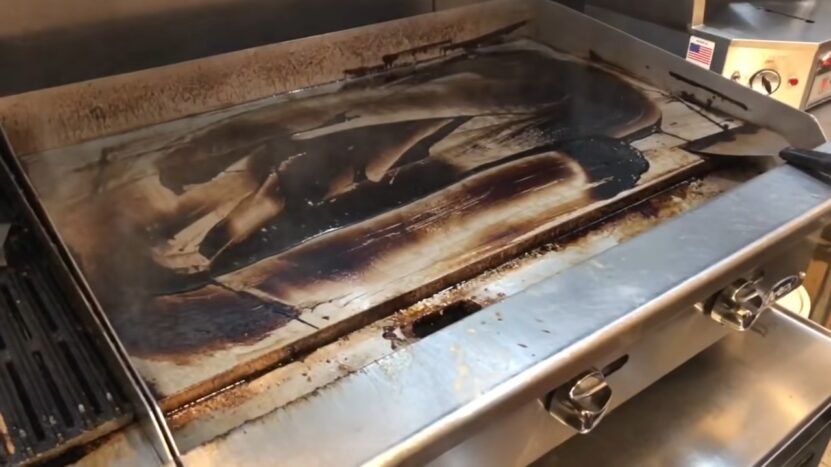Cleaning your flat-top grill is not just about aesthetics or hygiene. It’s about preserving the quality of your food, extending the lifespan of your flat top, and ensuring a safe cooking environment.
A clean grill prevents unwanted flavors in your dishes, reduces the risk of foodborne illnesses, and avoids flare-ups caused by grease build-up. Moreover, regular cleaning prevents rusting and maintains the non-stick surface of the flat top, making your cooking experience smoother and more enjoyable.
Clean As You Go
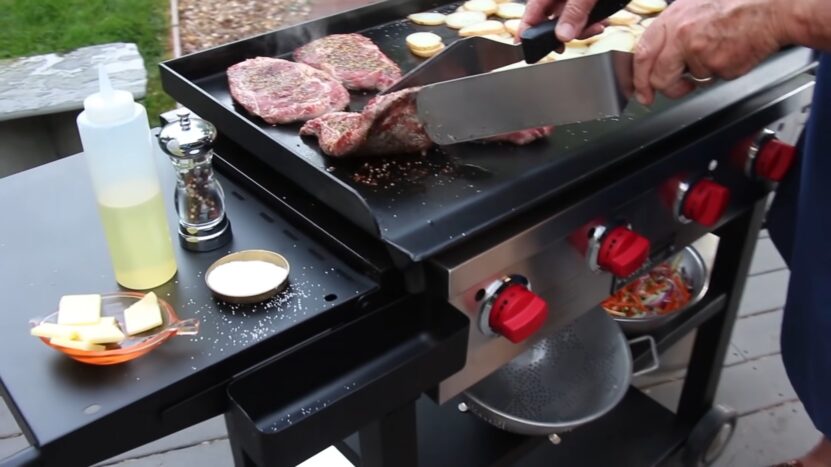
Cleaning as you go is not just a mantra for professional chefs but a practical approach for home cooks as well. The idea behind this is to prevent messes from accumulating to overwhelming levels and to remove clutter, which can be a distraction during the cooking process.
Here’s a more detailed breakdown:
- Organize workspace: Keep scraps on one side and finished pieces on the other to maintain a tidy workspace.
- Efficient waste management: Place your cutting board near the sink with garbage disposal for easy disposal of scraps.
- Store pre-prepped ingredients: Use airtight containers to store excess prepped ingredients and keep countertops clutter-free.
- Reuse utensils: Rinse and sanitize utensils between tasks by keeping a pot of simmering water on the stove.
- Immediate cleanup: Keep a damp kitchen towel by your side to wipe off spills and sticky residue as they occur.
- Sanitize: Use a water and bleach solution to sanitize your workspace after handling poultry, meats, or seafood.
- Minimize dishwashing: Use one bowl to hold prepped ingredients when possible to reduce the number of dishes to clean later.
Turn Off the Heat Early
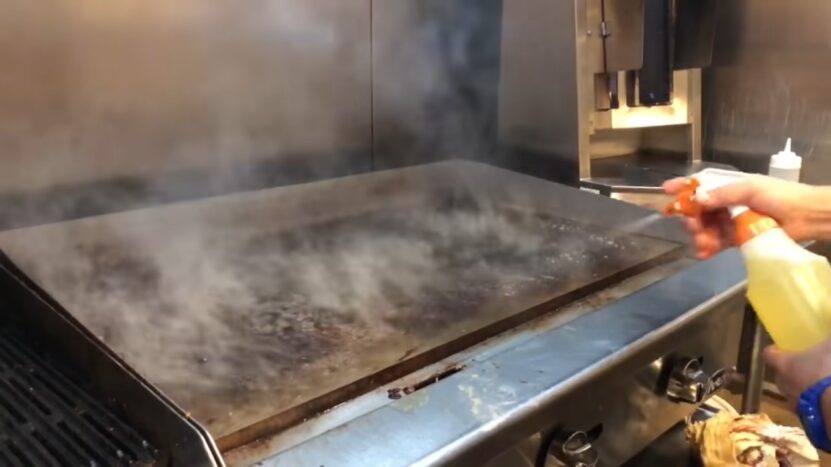
When your food is almost ready, it’s a good idea to turn off the grill. This is because it retains enough residual heat to finish cooking your food.
Moreover, turning off the heat early ensures that leftover juices or sauces don’t burn on the grill, which would make it more challenging to clean later.
Use a Bench Scraper
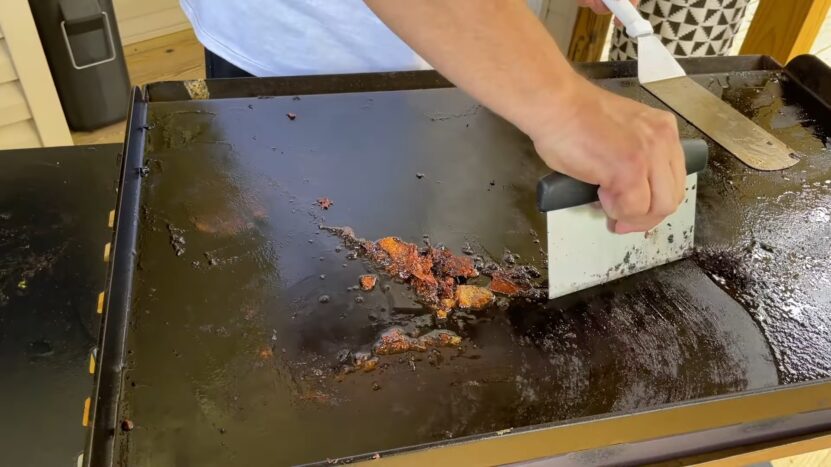
A bench scraper is an indispensable tool for cleaning your grill. After you’re done cooking, use it to push any leftover food and grease into the grill’s trough. This tool is designed to clean without causing any damage to the grill’s surface.
However, it’s crucial to use it correctly. Ensure the entire edge of the scraper contacts the grill simultaneously to avoid scratching or denting it.
Remember, the bench scraper is your ally in maintaining a pristine grill, but if used incorrectly, it can be detrimental.
Wipe Down While Warm
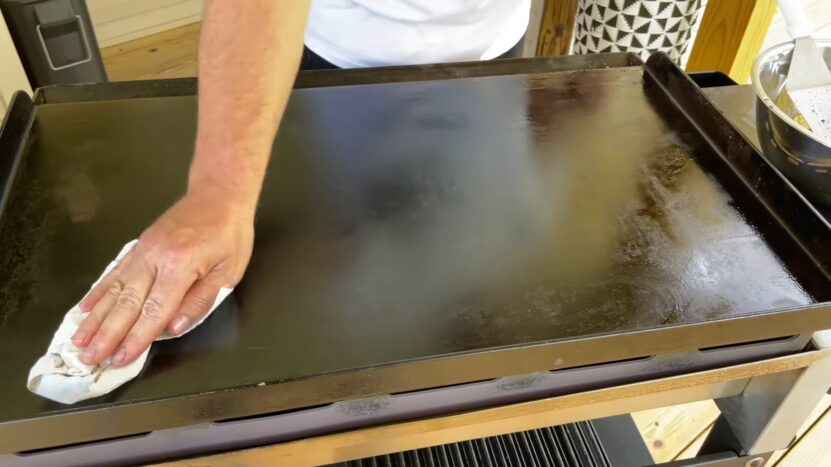
Cleaning your grill while it’s still warm is a crucial step that many overlook. The warmth of it makes it easier to remove grease and burnt-on food particles.
When you don’t clean your grill, these remnants from past grilling sessions accumulate. Not only can this grease and food harbor and attract germs, making it unsavory, but rancid oil or burnt marinade are not the flavors you want your flat top to add to your meal.
Chef Sedesh Boodram of Anvil Pub & Grill emphasizes the importance of cleaning the grill, stating, “Mold and bacteria can get onto your food, potentially making you sick. Although the flames help kill some of it, only cleaning can eliminate it.”
Moreover, if you grill red meat, some of those black bits clinging to your grates could contain harmful carcinogens formed when its fat is incinerated. A seriously dirty flat top could also be a fire hazard; thick layers of old grease can flame up.
Stuck-on grime also affects your grill’s performance, hindering it from reaching and holding the right temperature.
Season the Grill
After cleaning, it’s essential to season your grill. This not only protects it from rust but also ensures that it remains non-stick for your next grilling session.
Chef Boodram recommends applying oil to the grates when cool to prevent rusting and corrosion. Regularly oiling your grill’s surface or grates can significantly extend its life.
Avoid Soap
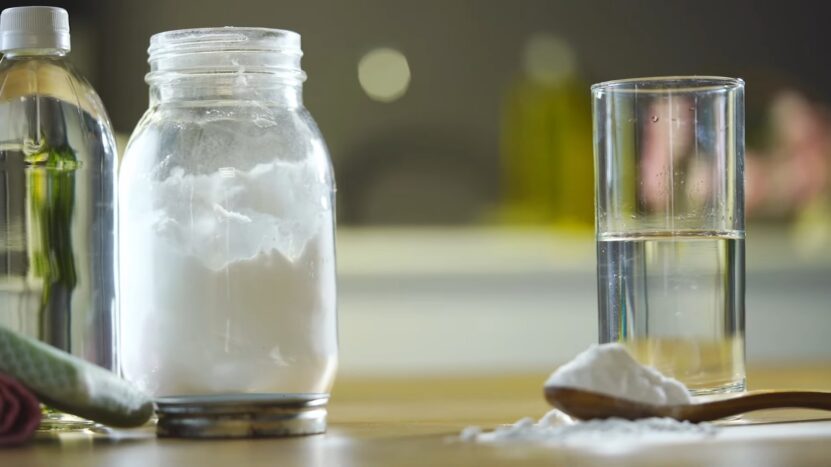
While it might be tempting to use soap for a thorough clean, it’s a big no-no for grills. Soap can strip away the grill’s seasoning, making it less non-stick.
Instead, use natural cleaning agents like vinegar or a mixture of baking soda and water. If you must use a cleaning solution, opt for a grill-specific cleaner or a mild dishwashing liquid.
Always ensure you rinse thoroughly to remove any soap residues. Remember, the flavors from your grill should come from the food and not from leftover cleaning agents.
Routine vs. Deep Cleaning
Routine cleaning is a quick and essential process that should be done after every grilling session. It involves scraping off food particles, wiping down the grill, and applying a thin layer of oil to season it. This regular maintenance ensures that it remains in optimal condition for your next cooking adventure.
On the other hand, deep cleaning is a more thorough process that addresses all of your grill’s surfaces and parts. It might involve soaking certain components, scrubbing with specialized cleaning solutions, and ensuring that every nook and cranny is free from grease and grime.
Jennifer Kornegay from Food & Wine suggests that if you maintain a consistent routine cleaning, you’ll only need to deep clean once or twice a year. This deep cleaning process ensures that any accumulated gunk, which could affect the grill’s performance or the flavor of the food, is entirely removed.
Avoid Ice
Using ice to clean your grill might seem like a quick fix, especially for commercial grills where this method is sometimes recommended. The idea is that the cold ice against the hot grill will cause the grease and food particles to harden and scrape off easily.
However, this drastic temperature change can be harmful to residential grills. It can lead to warping and cracking, which not only affects the grill’s performance but can also shorten its lifespan.
Proper Bench Scraper Use
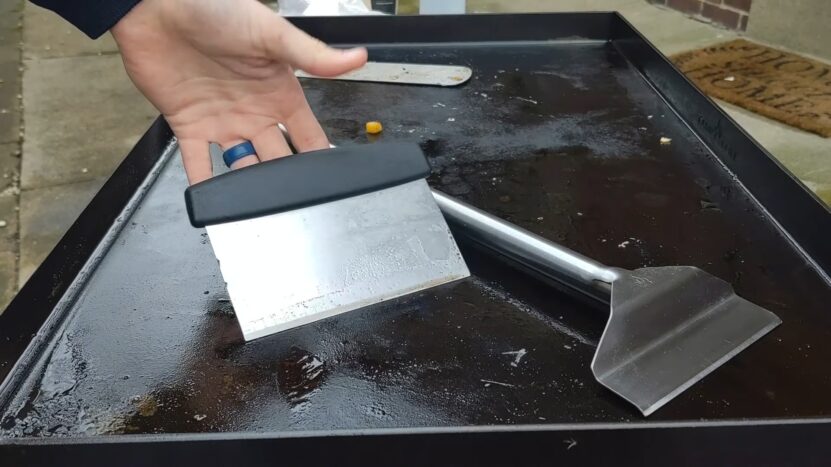
A bench scraper is an invaluable tool for maintaining a clean grill. However, its effectiveness is dependent on its proper use.
When using the bench scraper, it’s essential to ensure that the entire edge contacts the grill simultaneously. This uniform contact ensures that food particles and grease are effectively pushed into the grill’s trough without causing any damage.
Using the scraper in a back-and-forth cutting motion can lead to scratches or dents on the grill’s surface, which can affect its performance and longevity.
Avoid Harsh Scouring Pads
While it might be tempting to use a scouring pad or steel wool to get rid of stubborn grime, it’s essential to resist this urge. These abrasive materials can strip away the grill’s seasoning, making it less non-stick.
Moreover, they can leave tiny scratches on the surface, which over time can lead to rusting or further damage. Instead, opt for softer cleaning tools and solutions that are specifically designed for grills.
This ensures that your grill remains in top condition without compromising its integrity.
Household Items for Cleaning a Flat-Top Grill
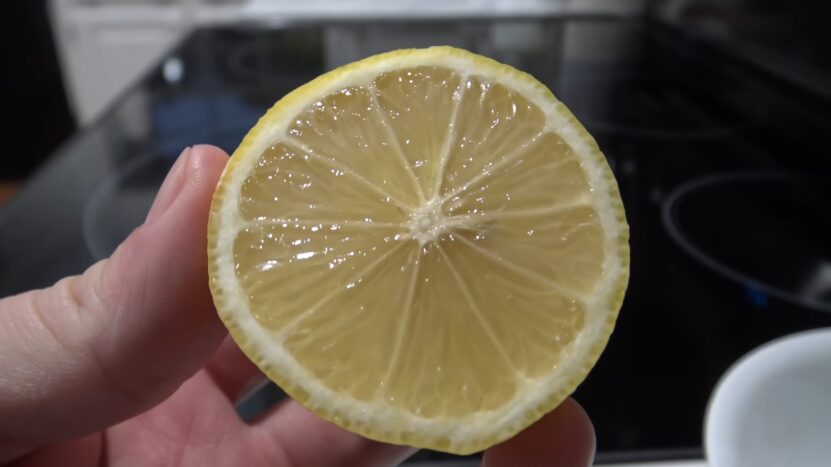
Cleaning a flat-top grill doesn’t always require specialized cleaners. Here’s a list of household items that can be effective:
- Vinegar and Water: Mixing these in equal parts creates a solution that can dissolve grease and food residues.
- Dishwashing Liquid: This everyday kitchen item is effective in removing grease and food particles from the grill.
- Lemon Juice: A natural cleaner that, when mixed with water, can enhance its cleaning properties.
- Baking Soda: Known for its abrasive nature, it’s great for scrubbing away stubborn residues.
- Coffee: If you have leftover brewed coffee, it can be used to break down grease and food particles on the grill.
- Beer: The combination of carbonation and acidity in beer can assist in cleaning the surface effectively.
- Onion: An interesting method involves rubbing a halved onion on a hot grill. This not only helps in removing residues but also seasons it.
- Soda Water: The fizziness or carbonation in soda water can lift and remove residues from the grill surface.
FAQ
Why is it important to clean a flat top?
Cleaning a flat-top grill is essential for sanitation and ensuring that the food prepared on it is safe to eat. Leftover grease and food debris can lead to off flavors in your dishes and uneven cooking. Moreover, if not cleaned promptly, the residue can harden, making it more challenging to clean later.
When is the best time to clean a flat-top grill?
It’s best to clean the grill as soon as it has cooled down enough that it doesn’t burn when touched. If you’ve cooked foods with saturated fats, like butter or bacon grease, start cleaning when these fats begin to solidify at room temperature.
Are there any other tips for cleaning a flat-top grill?
Yes, always clean every component of the grill, including the drip tray and grease drain. Also, choose your cleaning method based on the grill’s construction material. After cleaning, it’s essential to season it with a neutral oil to prepare it for the next use.
Are there any commercial products designed for cleaning flat-top grills?
Yes, there are commercial grill cleaners available in the market specifically designed to clean flat-top grills. They are formulated to break down grease and food residues effectively.
How often should I clean my flattop grill?
It’s recommended to give your grill a light cleaning after every use to prevent buildup. Deeper cleaning can be done every few weeks or depending on the frequency of use.
Last Words
Cleaning your flat-top grill is a simple yet crucial task. Regular maintenance ensures delicious meals, a long-lasting grill, and a safe cooking environment.
By following these easy methods, you’ll keep your grill in tip-top shape, ready for your next culinary adventure. Happy grilling!
